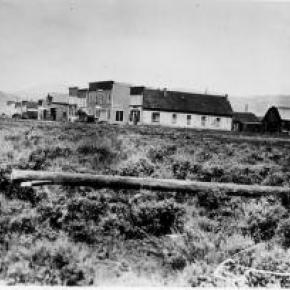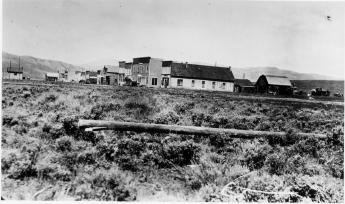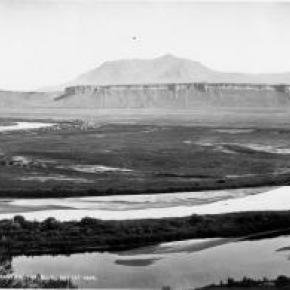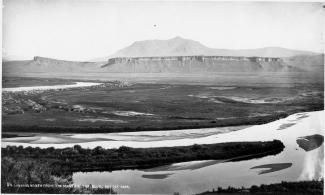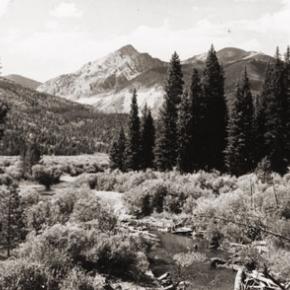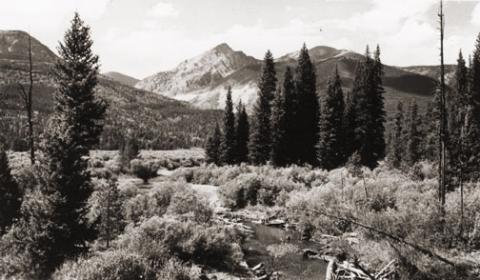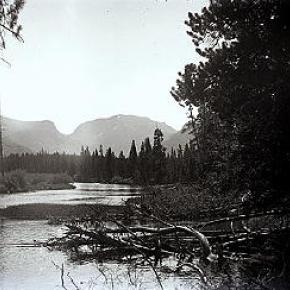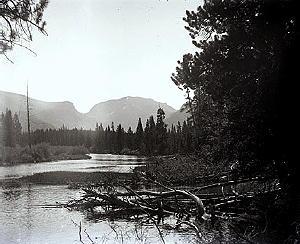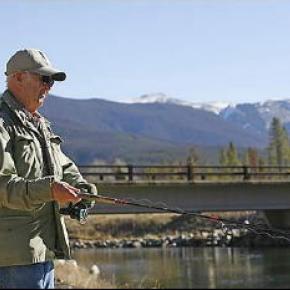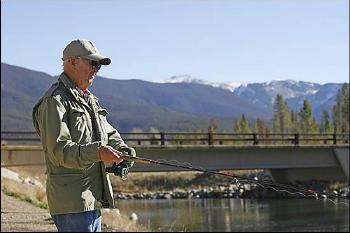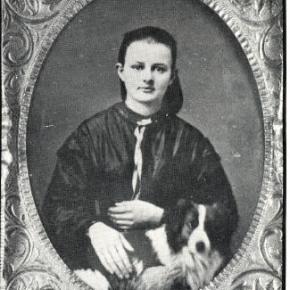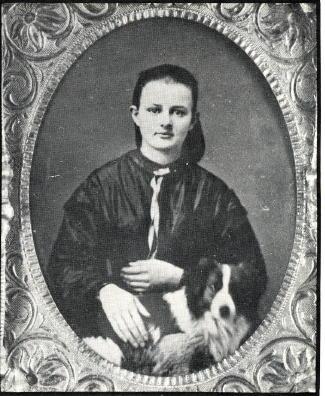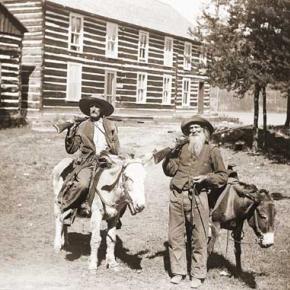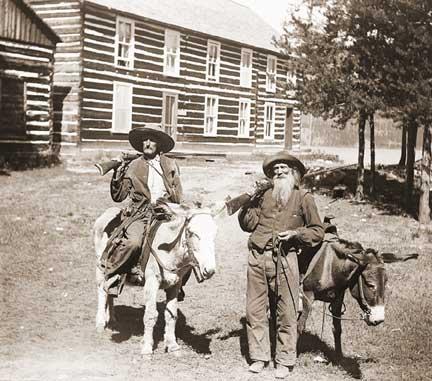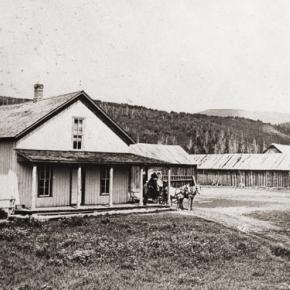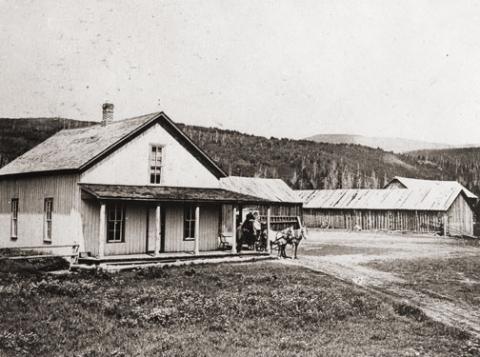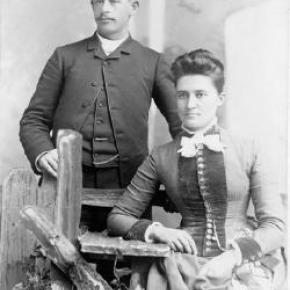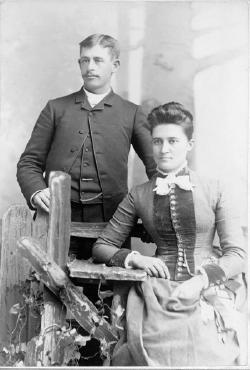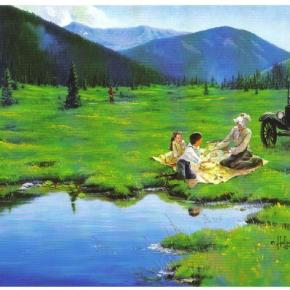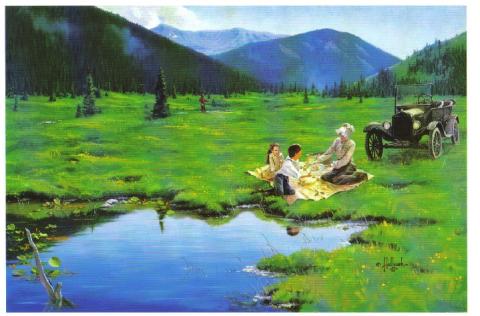Stories and Poems of Past Memories Articles
| Like Father Like Son |
Like Father Like Son
The Wichita Millers lived in one of those lovely old homes, blessed with fine trees lining the streets, large shady yards, and an easy arrangement within, that made family or visitors feel welcome. Three stories and a basement allowed plenty of space for a family of six. The roomy dining area looked out onto the grassy backyard and flower garden, but the windows were rather small. About this time, the notion of picture windows came into being. C.D. thought about this for a spell; good idea! I want more light and a view. Following through on the idea, he fetched his sledge hammer one afternoon and with a mighty wallop, he broke through the dining room wall! Presto....a larger scene. It took a while to trim out the whole, but the end result was totally satisfying. This "grab the bull by the horns" attitude was passed through to Dwight. We had moved into a nice modular home in December 1979. A few years later, we decided we needed a garage; the solution was to lift the house and build a lower floor beneath it. Dwight, his Uncle Ed, and I drove to the ski area where some used oak railroad ties had been cast aside. We gathered a large number of these (Have you ever tried hefting a tie?) and we hauled them home. Dwight had four extra-powerful jacks that he'd used previously to lift houseboats down at Lake Powell. After undoing all the foundation bolts, we started lifting, first one end, then another, building increasingly high cross-hatch type supports near each corner as we raised the house higher and higher. We lived there the entire time this was going on and the house shook with our every step. By the grace of God, no huge winds came up during the whole process. Each morning, Dwight disconnected the water and the sewer lines. Each evening, he reconnected everything. When we were up about eight feet, Dwight and his uncle built stud walls and stood the first wall beneath one side of the house. Would you believe that, thanks to the irregular ties, the house was skewed about six inches out of alignment? Troubles. Now what? Dwight decided that he would take his CAT and carefully push the house back into line, readjusting the braces as he went. That was the day I chose to go to Denver for supplies, knowing full well that when I returned, my piano and good china would be sitting in Ranch Creek. But no. When I got back, all four stud walls were securely in place and the upper floor was resting safely on top. Was it the luck of dumb dumbs? Brilliance? Who knows? Well, in order to go downstairs, we had a fairly steep stairway. We had looked at our various options for less steep stairs, but one would have ended up in the middle of the garage and the other would have had to start in our bedroom. Not good choices. Thus it was steep. Somebody accused us of having the only carpeted ladder in the county. It was also rather dark. One Thanksgiving Day when the family was gathered round, Dwight got the brilliant idea to cut an opening in the upper section of the wall at the top of the stairs, to make it lighter. The family agreed that this was a great idea and they were excited to see how this was accomplished. Out came the skill saw, bursts of sawdust flew into my nice clean living room and onto my counters where I was trying to prepare a festive dinner. I tried to shield the food from sawdust. I tripped over the cord while setting the table. I scrambled over scrap wood trying to reach pans and dishes. But the family loved it. By supper time, a rough hole definitely brought more light, and amazingly, we were still married! |
| My Granby, Little Old Log Church |
My Granby, Little Old Log Church

Contributed by Vera "Stathos" Shay, Kremmling...Granby resident 1930-1945 From what I hear It is very near To be torn away The little church of my childhood day The most beautiful to see That can ever be Inside and out Without a doubt Built of log so fine In the style of old time In my own little chair Every Sunday I was there The chime of its bell For miles around Heard its wonderful sound For a while our school We didn't fit So in our church were classes For a bit Beside our church on the hill We sledded for a thrill That poor little church They moved it around All over town Proudly it's hung together In all kinds of weather Every time I go to Granby town I look around to find And have a look At my log church for my eyes' Memory book Now they say it's got to go Pray it won't be so All of you Granby folk Louder you should have spoke To save that church with its Memories and history For there could never be Anything that would compare Built or put there With my magnificent, beautiful Childhood Granby log church Find it in your hearts To never let it be torn apart.
April 2005
|
| Next stop - Kremmling |
Next stop - Kremmling
The rails reached Kremmling town
|
| Sir Edmund Hillary visits Grand County |
Sir Edmund Hillary visits Grand County
The Middle Park Times announced with excitement: Sir Edmund Hillary is going to visit Grand County! The paper reviewed his famous climb up Everest in 1953 at age 33, his New Zealand background, his other well-known exploits; his picture was highlighted on the page with his story. This was news of great interest to the area citizens, for there was little in the way of unusual happenings as a rule. Dwight Miller had wandered down to the Hideaway Park Post Office one summer afternoon, when a man, asking for information, stopped him. "Can you tell me where the Tabernash Campground is?" Dwight took one look at him and recognized the long, somewhat horsey-looking face. The chap's accent sounded British to Dwight, too. "Are you Sir Edmund Hillary," he asked? "Why yes, I am," answered Sir Edmund. "We're traveling through this area and want to spend the night." For a moment Dwight considered asking him and his party to stay at Miller's Idlewild Inn that night, but he thought probably the group really preferred being alone to enjoy the countryside, rather than having to deal with crowds. He was aware that the climber was a very shy, modest man. So he told Hillary to drive about six miles on down Highway 40, through Fraser and Tabernash; then follow the road to the top of Red Dirt Hill. The campground he wanted was on the right side of the road, just before it descended toward Granby. Close by, on the left side of the highway, Hillary would see a large meadow, in which were dairy cows, belonging to the Acord Dairy, I believe. "The campground is set among the pines with just a few camp sites, so you shouldn't be disturbed," Dwight said. Sir Edmund thanked Dwight and the two of them chatted a bit more. "We just came over Berthoud Pass a bit ago; in fact we ate lunch there. Something that really puzzles me is that I see you Americans just eating lunch while sitting in your cars or on your tailgates; and yet, if you were to take your lunch and walk about 100 feet, you would have all the valleys before you and never know that you that you were even near another person!" "That's true," said Dwight. "I think that Americans are always in a hurry. They don't want to take time to walk a few feet. It's just eat and run." "Well, it amazes me. You live in such beautiful country." They said goodbye then and the Hillarys drove on down to the campground. Dwight was so very pleased to have had this chance to meet him. This campground was shut down some years later when the U.S. Forest Service traded that land to the Silver Creek group for some other property, so that Silver Creek could have a convenient road into their development. The campground was located just beyond the turn in to Snow Mountain Ranch, as one heads west. A few site remnants can still be seen there. |
| Sounds of Christmas |
Sounds of Christmas
Contributed by Vera "Stathos" Shay, Kremmling A blast from the past A frosty night in December A wonderful time to remember Fun on a hay ride My husband at my side Friends young and old Dressed for the cold A pickup truck Praying it wouldn't get stuck Snuggled together in the sled of hay We were on our way Our hearts and voices filled with song From our Christmas caroling Kremmling did ring Everyone could hear Us ringing Merry Christmas cheer.
|
| The Middle Park Band and the Music Man |
The Middle Park Band and the Music Man
The Middle Park High School band wasn’t much to brag about, and that’s a fact. Several members were very capable young musicians, however. For instance, Stuart played a hot set of drums that set people’s feet to tapping and hands to clapping. Debbie was an excellent trombonist, good enough so that one year, she was invited to march with Pierre Laval’s All American High School Band in the Rose Parade! And Jack was right behind her in skill. Martha led the flutes beautifully, and there were Alan, Bert, Roxanne, Carolyn, and others. But the group never seemed to coalesce into a single playing unit. |
| The Rocky Mountain National Park |
The Rocky Mountain National Park
Poem contributed by Vera Shay, July 2006 Once you've been there It'll be your most favorite anywhere The beauty up through the trees It's bound to please From May through September Sights and Sounds you will remember Deer and moose grazing on meadows so green All in their splendor to be seen You will return again and again In the fall just heat the bugle-call Of the elegant, determined elk so strong Choosing his mate to follow him along Mountain lion and even brown bear are there They you might hope to only from afar Or the windows of your car The Grand Lake Lodge in the park Cabins looking so cozy and fun A plan my husband and I to spend the night We didn't get it done In the Lodge Restaurant we had dinner A many a time With food so fine My birthday dinner, year after year With happiness and cheer Yes this is a park to yourself and your friends you say I love this park any summer day The For me many memories in this park
|
| What I Got For Christmas by Nicolette Toussaint |
What I Got For Christmas by Nicolette Toussaint
It’s December, the tail end of 1959, and I’m hanging onto the back of an Airstream trailer. I have shimmied my ski pants down as far as possible. Now I‘m struggling to keep my balance, trying to keep my new toe-to-thigh cast dry and do my business — the only business that could have forced me out into this sleety, blustery night. The combination of the cast’s weight, the sloppy, slippery snow, the fabric bunched around my knees, and my wobbly attempts to avoid peeing on my underwear overthrow me. I tip over and slide partway beneath the trailer. Now it looks like a very big dog has dug a bathtub-sized hole while using the trailer’s rear corner as a fire hydrant. But dogs are much better at this leg-lifting maneuver than I am. So much for dry underwear.
The day before Christmas, I broke my leg skiing at Winter Park. My parents could have taken me back to Denver — an hour and a half over icy Berthoud Pass, but more since our car is pulling a rented trailer. The better option was to go to Kremmling, an isolated mountain town an hour west of Fraser, a town nicknamed “America’s ice box” because it usually reports the coldest temperature in the country. The clinic in Kremmling was tiny, just a few white rooms. I don’t remember how I fell, just that my ski bindings— the old-fashioned “bear trap” kind rather than the new-fangled, heel-release kind — didn’t let go. My heavy, wood skis torqued my leg, snapping the bone. I do remember the ski patrol bringing me down in a toboggan. I remember my Mom, Myra, sitting in the back seat so she could hold my hand and put my head in her lap during the long drive. My leg screamed every time we went around a corner, and it seemed like it took 50 years. I don’t remember who carried me from the car. But I do remember my pants’ leg being slit up the seam, and I remember being X-rayed by Dr. Ceriani.
I don’t think I will ever forget getting my leg straightened. My Mom and Dr. Ceriani’s nurse held my shoulders while the Doc pulled my shin straight. I screamed bloody murder. After the Doc and his nurse made my cast — layers of plaster-soaked gauze that were wound round and round my cotton-wrapped shin — Dr. Ceriani said it would take a day to harden. It would be best for him to keep an eye on me for awhile. So I stayed in Kremmling while my family went on with their ski vacation. That’s how, at age 9, I wound up spending my first Christmas apart from my family. I had coloring books and puzzles, but no TV. The radio was intermittent. I was feeling kind of sorry for myself, being alone on Christmas and all, until the nurse promised she would visit me. She was from Ireland; I think her name was Kathleen.Sure enough, she came on Christmas Day, bringing a record player and a brown paper bag tied with a red bow. Kathleen put on a ’45 and danced an Irish jig for me. Then she gave me the bag. Inside was a tree made from papier-mâché. It was layered up like my cast, but scalloped and decorated with shiny beads and buttons, and built over an empty mayonnaise jar. When I turned it over, I saw the lid. I unscrewed it, and out fell a small avalanche of Tootsie Rolls, peppermints, and Hershey’s Kisses! I felt loved.
My parents came back in a day or so, of course, and I spent the rest of the family vacation in the Airstream trailer (rented because we couldn’t afford hotels) and in day ski lodges, bored silly, with my right foot propped up on a chair. When I got back to school, I had to gimp to class by way of a somewhat sloping hall with a slippery, speckled stone floor. Try that on crutches! I wasn’t a popular kid, and because of the ski vacation, I’d missed the school Christmas party. But suddenly I was as popular as a Pez dispenser! Everyone in my third-grade class wanted to try out my crutches, carry my coat, and sign my cast. The next fall, I was back skiing, albeit with better skis and new Cubco safety bindings. I didn’t think about my broken leg until decades later.
Fast forward to around 2000. One unusually warm spring day, I walked from the San Francisco office where I worked to a food court in a high-rise on Market Street. As I was looking for a place to eat my Pad Thai, I noticed a photo display on the other side of the lobby. The Knight Foundation, whose programs I sometimes attended, was on the top floor, and they often mounted photo-journalistic shows, so I strolled over. The exhibition was called “The Country Doctor”. A historic collection of photos by W. Eugene Smith, the images had first appeared in Life Magazine in 1948. Stark, black-and-white, and unflinchingly intimate, those photos solidified Eugene Smith's stature as one of the most humane and preeminent photojournalists of the 20th century. Those photos instantly transported me back 50 years, out of sunny San Francisco and back into cold, snowy Kremmling, Colorado.
From the exhibit, I learned that following World War II, a fundraising committee had raised $35,000 to turn the home of the Kremmling’s retiring doctor into a 14-bed hospital, stocking it with as much equipment as they could afford. Some of it was war surplus machinery. The new clinic had an autoclave, an oxygen tent, and an X-ray machine — probably the same one that had revealed the spiral fracture in my right tibia. In 1947, that committee had hired Dr. Ernest Ceriani. Born on a Wyoming sheep ranch and educated in Denver, the young doctor was the only physician in Middle Park, a barren, windswept Rocky Mountain valley above 8,000 feet. His practice spanned 400 square miles. As the photos showed, he was a general practitioner, tending to the dying, delivering babies, cooling fevers, and patching people mangled by farm, ranch, auto, and sports injuries. Injuries like the one I had suffered nearly 50 years before!
With tears pricking my eyes, I realized that I had only been able to walk unaided through the exhibition thanks to the foresight of that 1947 committee in Kremmling, Colorado. I owed a debt of gratitude to a group of people I had never met, people who undoubtedly had passed away long ago. We stand on the shoulders of those who have gone before us. In my case, the “standing” part is literally true. Without the initiative of that committee, there would have been no clinic in Kremmling. Without them, I wouldn’t have been hospitalized for what seemed, at first, to be a sad and lonely Christmas. I wouldn’t have had the experience of nurse Kathleen turning that clinic stay into the most memorable Christmas of my life. And I wouldn’t have been able to stand in tribute to Dr. Ernest Ceriani. While the hula hoops, bikes and Barbies I received as a child have long-since been broken and forgotten, across the miles and years, the gift given to me by that country doctor has remained whole and straight, strong and true. |
- ‹ previous
- 2 of 2









